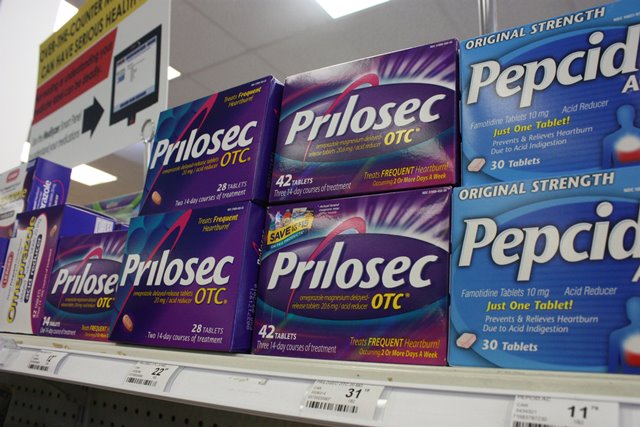At prescription strength, proton-pump inhibitors are associated with a potential 25% increased risk of early death from any cause, suggests new research published Monday in the British Medical Journal Open.
This study did not examine over-the-counter proton-pump inhibitors or particular brands of prescription-strength drugs.
The drugs, known as PPIs, suppress excess acid in the stomach. Generally, prescription formulas are taken by patients with severe conditions for long periods, while lower-dose over-the-counter formulas are approved for only short-term use by the US Food and Drug Administration.
The researchers note that their study does not prove cause and effect.
Head-to-head comparison
Previous research has linked proton-pump inhibitors to an increased risk of poor health, according to senior author Dr. Ziyad Al-Aly of the Washington University School of Medicine. “A number of studies reported that use (of these drugs) is associated with a number of adverse events including kidney disease, fractures, pneumonia, dementia, C. diff infections and cardiovascular disease,” he said.
Al-Aly and his co-authors “asked the simple question: Does that translate to increased risk of death?” To answer it, they looked at national US Department of Veterans Affairs data on about 3.5 million people.
“The VA has the largest integrated electronic medical record system in the world,” Al-Aly said. “This enabled us to look at a large number of patients and follow them up for about six years to examine our research questions.”
The team compared people who took proton-pump inhibitors with those who took another type of drug that reduces stomach acid: histamine H2 receptor antagonists, known as H2 blockers. They also made other comparisons, including people who used proton-pump inhibitors versus people who did not take either H2 blockers or PPIs.
People who used proton-pump inhibitors experienced a 25% heightened risk of death from all causes compared with people taking H2 blockers, the researchers estimated.
If about 500 patients took proton-pump inhibitors for a year, there would be one death that may be related to the drug use, explained Al-Aly. The longer patients used PPIs, the higher their risk of early death, he added.
When comparing users of proton-pump inhibitors with non-users of PPIs or H2 blockers, the same 25% higher risk level was seen, the analysis indicates.
“In our studies, however we looked at the data, there was always a consistent relationship between (proton-pump inhibitor) use and the risk of death,” Al-Aly said.
Al-Aly and his co-authors say the biological reason for a link between PPIs and increased risk of early death is not clear. Evidence suggests that these drugs change how genes express themselves, increasing some DNA activities while decreasing others. It is these genetic differences that may contribute to earlier deaths.
The growing body of scientific evidence “showing a host of adverse events” associated with use of these drugs is “compelling,” concluded Al-Aly and his co-authors. They say that limiting a patient’s use of these drugs “to instances and durations where it is medically indicated may be warranted.”
AstraZeneca, a global drug company, makes two popular products, both of which come in over-the-counter and prescription-strength formulations.
“We are confident in the safety and efficacy of Nexium and Prilosec when used in accordance with the FDA approved label, which has been established through numerous clinical trials,” said Alexandra Engel, a spokeswoman for AstraZeneca, which was not involved in the new study.
The study “did not look at OTC products, rather, it only involved prescription (proton-pump inhibitors) which are typically used at higher doses and for longer durations,” said Anita Brikman, senior vice president at Consumer Healthcare Products Association, a trade organization representing over-the-counter drug manufacturers. The association was also not involved in the research.
“This is an observational study, so no firm conclusions can be drawn,” Brikman added.
Questions for future research
This type of study, which retroactively looked at the medical records of older veterans, cannot prove that proton-pump inhibitors increase the risk of death, according to the Science Media Centre, a United Kingdom nonprofit that provides commentary on scientific studies. The center’s volunteer statisticians noted that up to 10% of people taking proton-pump inhibitors died within one year, which suggests that the deaths may be linked to their’ other conditions.
Dr. Ihab Hajjar, an associate professor at the Emory University School of Medicine, said the new findings are “concerning.”
“However, it is important to note that (proton-pump inhibitor) users in general, including those included in their study, are older and have more diseases,” Hajjar wrote in an email. “Nevertheless, it is important for patients to regularly review all current medications with the prescribing providers.” Once reviewed, any drug deemed unnecessary by a doctor should no longer be used by a patient.
This month, Hajjar and his colleagues published their own study of proton-pump inhibitors.
They focused on cognitive impairments, comparing people who have used the drugs with people who did not. Hajjar and his team did not look at other diseases or overall mortality.
In his study, a team of experienced doctors at academic medical centers made a “more detailed assessment of cognitive function” than the previous research, he said. Perhaps for this reason, Hajjar and his team arrived at different conclusions than other researchers.
“We did not demonstrate an increased risk of having a cognitive impairment with the use” of proton-pump inhibitors, Hajjar wrote.
By contrast, Al-Aly and his co-authors believe a “growing body of evidence” indicates that use of these drugs is associated with a “host of adverse events.” They say that limited use only when medically necessary is best.



